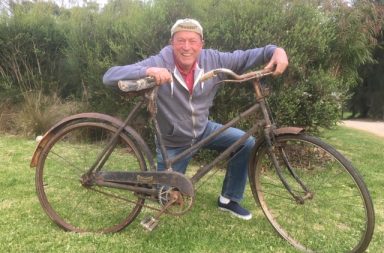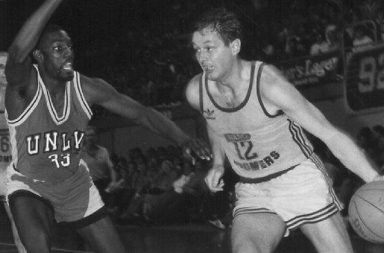June 15, 2016
Oh to be a twenty-something with a head full of dreams!
Lately I’ve had the privilege of travelling around the country, filming stories on Rio-bound Olympians for Channel 7’s telecast of the Games.
It’s a time of high excitement in a few hundred households across Australia.
This fever has been building for many years, captivating not just the athletes, but their families, friends, colleagues and everyone they know.
I’ve met several families that are spending everything they have on accommodation in Rio in August, even extending their mortgages, so that they can see their loved one fulfil their dreams.
Some are paying $900 a night for accommodation; unsuspecting victims of the usual Olympic city gouging.
They even forked out the money for lodgings before their family member was actually selected on the Australian team.
They’d never take this sort of risk on a family holiday, but this is probably the only occasion in their lives when cost gets lost in the blur of anticipation and expectation.
They’ve lived for many years with a dreamer; they’ve shared the hopes, uncertainties and insecurities, they’ve driven the athlete to training in the week hours of the morning, they’ve stood in the heat and the cold to watch their events, they’ve shared the small victories and they’ve been the shoulder to cry on when things have gone badly, when injuries have struck, or selectors have looked elsewhere.
Now the family members want to see it with their own eyes their child or sibling in the event that for so long has occupied the minds of the whole household. Rio 2016 is their holy grail.
Yep, that’s why Olympians do it – it’s pretty much all about the dream.
Many Olympic hopefuls participate in individual sports, where their dedication and application are the sole drivers of their destiny. They only go as far as they push themselves.
This contrasts with the popular team sports, such as footy, cricket and netball, where there are well-worn pathways for a an aspiring competitor to follow, and plenty of mates with whom to share the highs and lows.
A boy or girl who shows ability in a school team in popular sports is likely to be drafted into a club and – if they show potential – they’ll take the familiar tracks towards the elite level.
Reaching the highest echelons of any sport is a long-term ambition. It’s a thrill to be chosen on the squad, to make your sporting debut, to play your 100th game, to win a premiership or an individual honour, or to perform in front of a big crowd.
But the individual sports-person, which includes most Olympians, has to chart his or her own path and achieves results without the crowds and usually without the support of a team.
It’s a solitary journey.
Getting there in most Olympic sports depends entirely on your desire and motivation. There’s no team to drag you along, and more-than-likely you don’t have the lure of a huge financial payday if you make the big time.
In most cases, it’s a personal crusade. Fame comes to so few Olympians it’s not really a consideration, and even then recognition can be a double-edged sword.
How many Olympians can you name, and how many of them have recently had their struggles chronicled more than their achievements ever were?
If any of us were asked to name competitors on the Australian team for Rio, we’d be lucky to guess three or four. And, no, Ian Thorpe and Cathy Freeman aren’t on the team this year.
So it’s not about fame or fortune.
Adding to the fickle nature of the Olympic experience is the fact that the Games comes around only once every four years. If a person playing cricket gets out first ball, or a footballer has a bad day, there’s always next week. An Olympian must go through the whole process for another four years – and, more than likely, the opportunity never comes again. If he or she is an accomplished and durable competitor, they could possibly make two or three Games. But, for most, there’s just one shot at it. If you draw the wrong opponent first-up, or you have a bit of bad luck, it’s all over before you know it. Many courageous and dedicated sports-people are spending the rest of their lives trying to put Games disappointments behind them. That’s just another by-product of the Olympic sacrifice.
This personal campaign embroils the whole family. In my travels over the past few weeks, I’ve seen some remarkable stories of sacrifice.
I met one family who sold their house and moved from one side of Brisbane to a lesser house on the other side of the city, even though they loved their original house.
The reason? They wanted to be near the training venue and coach that would help their daughter in her mission to make the Olympic team.
I met another family who live so far from the big smoke that their 20 year-old son had to make a 10-hour round trip just to practice at a suitable venue. The young man, James Willett, and his dad Arthur would drive their ute from the family farm near Mulwala in the Riverina and camp overnight whenever James wanted to practice shooting double trap at the Werribee range.
Realising the long journeys couldn’t last, Arthur Willett and his mates set about building a training venue on the farm. The friends came from as far away as Albury to give James the chance of practising daily, which most of his European rivals take for granted. The volunteers turned up in a 40-plus degree heat, welding, building, concreting and putting together an Olympic-standard range for James to train on. It cost the Willetts over $100,000 to build, and they and their supporters spent hundreds of hours working on.
Arthur and Dionne Willett say James is worth the investment. He’s already won a World Cup this year, he’s on target for a great result at Rio and he could represent Australia in shooting at the next three or four Olympiads.
He’s a very likeable young man who will make Australia proud and Mulwala famous.
When the Willetts and their supporters were laying the concrete, several months before James was chosen on the Australian team, James Willett used a stick to etch a little memento into the concrete. It’s the five Olympics rings with the date ‘2016’.
Not that he needed to remind himself that the Olympics is what it’s all about.
The disappointment for the Willetts is that the family spent so much on building the practice venue that they haven’t got the dollars to go to Rio themselves. James will have to do it on his own.
Still, the Willetts and the friends who helped build the range will be cheering madly as they watch James’s Olympic competition on August 10.
They know that they’ve done everything they can to support the young man’s dream.
Around Australia there’ll be a few hundred families feeling the same way.



